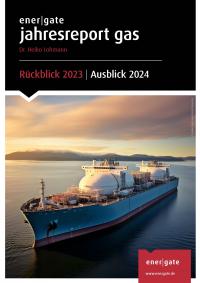2023 wird häufig als Jahr nach der Gaskrise beschrieben. Der Frage, ob dies wirklich so ist, geht Heiko Lohmann im energate Jahresreport Gas 2023 nach. Aber dies ist natürlich nur ein Thema. Im Jahresreport geht es unter anderem auch um die vertiefte Diskussion über die Zukunft der Gasnetze, die 2023 begonnen hat. Heiko Lohmann klärt zudem, warum nicht 2023, aber 2024 das Jahr wird, in dem der Markthochlauf für Wasserstoff …
Stay up to date with the free Gasmarkt-Newsletter! We will inform you about new issues by e-mail and give you an insight into the contents.

energate Gasmarkt Issue 07|2024
Topic of the month: Interview with Torsten Frank and Sebastian Kemper, Managing Directors of THE
 Dr. Heiko Lohmann
Dr. Heiko Lohmann
This edition is full of market rumours. However, this is mainly due to the sluggish political and bureaucratic decision-making processes. I couldn't even say for sure whether this is due to differences of opinion between the coalition parties, the work processes within the ministries or simply the complexity of the issues. But whether it's the hydrogen import strategy, the hydrogen storage strategy or the biomass strategy. The processes take longer than expected, additional expert reports or consultation processes are supposed to improve the outcomes. Market participants are constantly providing bits and pieces of information about what is currently happening but there are no transparent processes.
This also applies to the German government's power plant strategy, but for slightly different reasons. It has not yet been approved under state aid law. In June, reports circulated that the German government and the EU Commission had reached an agreement and that approval was only a matter of days away, but this also proved to be a premature assessment. Economics Minister Robert Habeck told the BDEW congress that all the "major" issues had been resolved with the Commission. But the devil is obviously in the detail. There is still no white smoke from Brussels. Potential investors in such power plants are eagerly awaiting the strategy and the capacity tenders based on it. But the longer-term prospects for the design of the electricity market, such as a capacity market or the further development of the CHP Act, also depend on the adoption of the strategy. The lengthy process is making people nervous.
This month's topic is an interview with the managing directors of Trading Hub Europe. We talked about several issues. For many market participants, the most important message is probably that there could be a distribution of surpluses in the balancing neutrality charge accounts: "Oh God," was the spontaneous reaction of one sales manager when I told him about it. Such a payout had already taken place once before, but at that time it had only led to tense discussions between the sales companies and their customers.
This is my last issue before my summer break. Enjoy the summer, dear readers, even if turbulence in the energy market cannot be ruled out. We'll be back in early September.
Topic of the month: Interview with Torsten Frank and Sebastian Kemper, Managing Directors of THE
Since 2022, the market area manager THE, which was founded in 2021, has experienced turbulent times. As a reminder, the joint market area has been in existence since 1 October 2021; THE was the result of the merger of Gaspool and NCG. During the gas crisis, the company briefly became the state arm for LNG procurement. The market area manager then became responsible for achieving the state filling level targets for storage facilities. THE was criticised fiercely, mainly for its storage management. However, the company's own business has also been characterised by the gas crisis since 2022. Prices for system control energy rose to unprecedented levels. The liquidity buffers for the SLP and RLM levy accounts were drastically increased, and the corresponding neutrality charges rose to record highs. [...]
Jahresreport Gas
Frequently Asked Questions
1. What is the energate Gasmarkt?
The energate Gasmarkt provides specialists and executives in the gas industry with up-to-date information and background information on the German and international gas market. The medium expertly explains the most important developments in the fields of market, law, politics and business. In addition, the energate Gasmarkt offers insider information such as market rumors and personal details.
2. What is the energate Jahresreport Gas?
The energate Jahresreport Gas traces the most important market developments of the year and provides a well-founded outlook for the coming months. Gas expert and insider Dr. Heiko Lohmann analyzes relevant events in politics, law and regulation as well as on generation, infrastructure and trade. In addition, the report provides information on changes in the corporate landscape and tracks price developments in market reports. Top decision-makers from the industry use the Jahresreport Gas as a compact chronicle of the year and to assess future market developments.
3. How often are these publications released and in which formats are they available?
The energate Gasmarkt is published monthly. Subscribers will receive the energate Gasmarkt as a print and PDF version in German and English. The Jahresreport Gas is published annually (beginning of December).
4. Can I purchase individual issues of the energate Gasmarkt?
Yes, you can purchase individual isses as print or PDF version. Payment options include purchase on account, credit card or PayPal.
5. How much is a subscription of the energate Gasmarkt and how much does the Jahresreport cost?
A subscription to the energate Gasmarkt (single licence) costs 110,- Euro/month (plus VAT). An edition of the Jahresreport Gas costs regularly 390,- euro (plus VAT).
6. Are there any special conditions if several employees in a company would like to receive the Gasmarkt?
With several Gasmarkt recipients in one company, the price of the second and all other licenses is reduced significantly. We are happy to make you a fair offer for team or corporate licenses!
7. What benefits do I get by registering?
A free energate account is required to order the energate Gasmarkt or the energate Jahresreport Gas. Registered users receive an overview of the contents of the current issue of energate Gasmarkt by e-mail on the day of publication.
8. I would like to read energate Gasmarkt or energate Jahresreport Gas digitally. Where can I find my e-paper version?
As a subscriber to energate Gasmarkt or as a purchaser of energate Jahresreport Gas, you will also receive an e-paper version in addition to the print edition. You can find it at online.energate-gasmarkt.de. Please use your energate account to log in.



